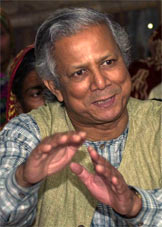| Home / International / International -- World | Tools: Save | Print | E-mail | Most Read |
| Award 'Great News' for Homeland |
| Adjust font size: |
"I am so happy, it's really great news for the whole nation," Yunus said when reached by telephone at his Dhaka home shortly after the prize was announced. Yunus and his Grameen Bank won the award for advancing economic and social opportunities for the poor, especially women, through their pioneering microcredit work. The 65-year-old is the first Noble Prize winner from Bangladesh, a poverty-stricken nation of about 141 million people located on the Bay on Bengal. One of his aides, Dipal Barua, said the award was an "honor for millions of poor women who have made this possible, it's a great achievement. It's a marvelous recognition." Yunus' Grameen Bank was the first lender to hand out microcredit, giving very small loans to poor Bangladeshis who did not qualify for loans from conventional banks. No collateral is needed and repayment is based on an honor system. Anyone can qualify for a loan the average is about US$200 but recipients are put in groups of five and once two members of the group have borrowed money, the other three must wait for the funds to be repaid before they get a loan. Grameen, which means rural in the Bengali language, says the method encourages social responsibility. The results are hard to argue with the bank says it has a 99 per cent repayment rate. Since Yunus gave out his first loans in 1974, microcredit schemes have spread throughout the developing world and are now considered a key approach to alleviating poverty and spurring development. Yunus said in a 2004 interview that his "eureka moment" came while chatting to a shy woman weaving bamboo stools with calloused fingers. Sufia Begum was a 21-year-old villager and a mother of three when the economics professor met her in 1974 and asked her how much she earned. She replied that she borrowed 5 taka (9 US cents) from a middleman for the bamboo for each stool. All but 2 US cents of that went back to the lender. "I thought to myself, my God, for five takas she has become a slave," Yunus said in the interview. "I couldn't understand how she could be so poor when she was making such beautiful things," he said. The following day, he and his students did a survey in the woman's village, Jobra, and discovered that 43 of the villagers owed a total of 856 taka (about US$27). "I couldn't take it anymore. I put the US$27 out there and told them they could liberate themselves," he said, and pay him back whenever they could. The idea was to buy their own materials and cut out the middleman. They all paid him back, day by day, over a year, and his momentary generosity grew into a full-fledged concept that came to fruition with the founding of Grameen Bank in 1983. In the years since, the bank says it has loaned 290.03 billion taka (US$5.72 billion) to more than 6 million Bangladeshis. Worldwide, microcredit financing is estimated to have helped some 17 million people. (China Daily October 14, 2006)
|
| Tools: Save | Print | E-mail | Most Read |
 |
| Related Stories |
|
| ? |
